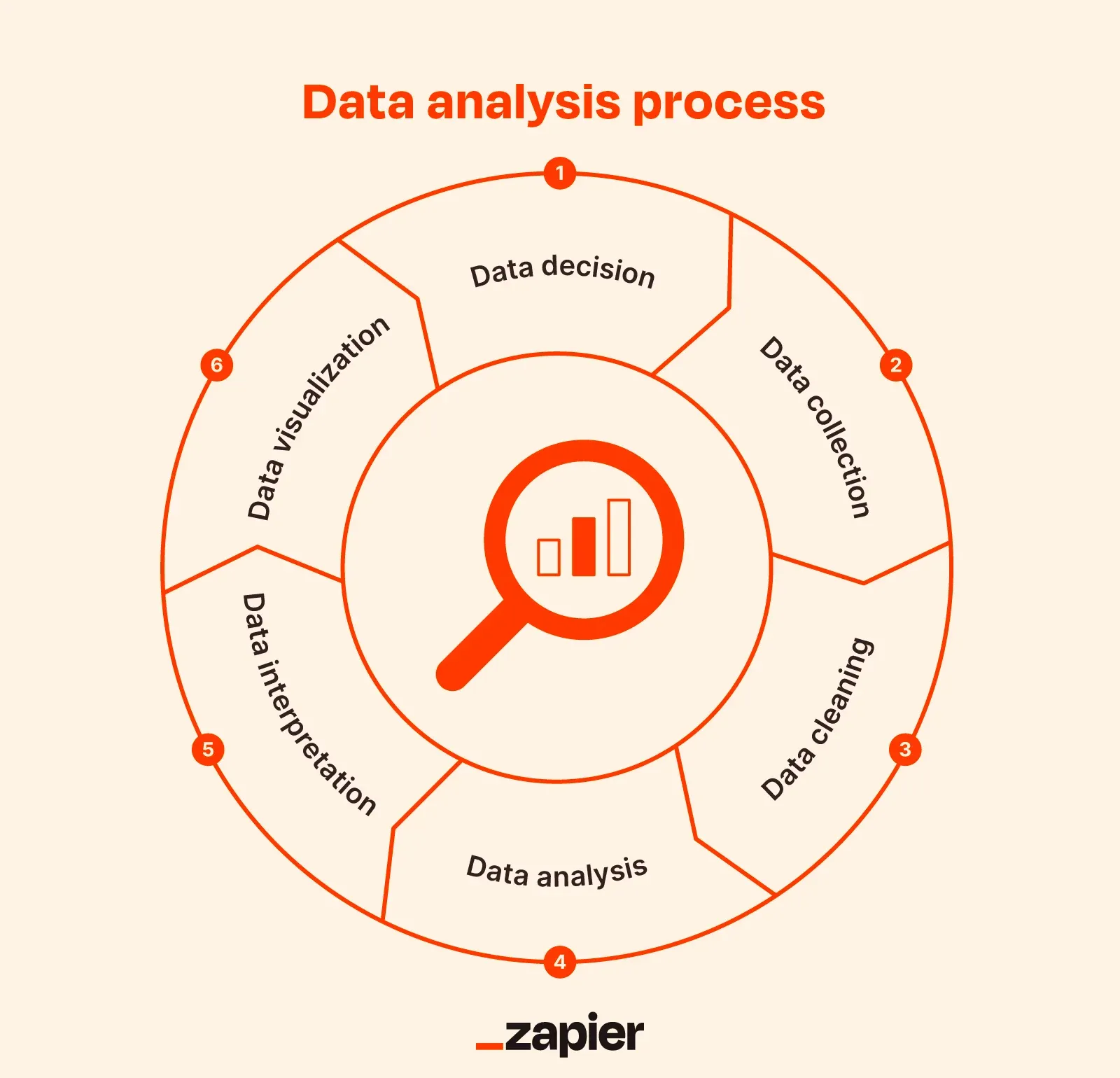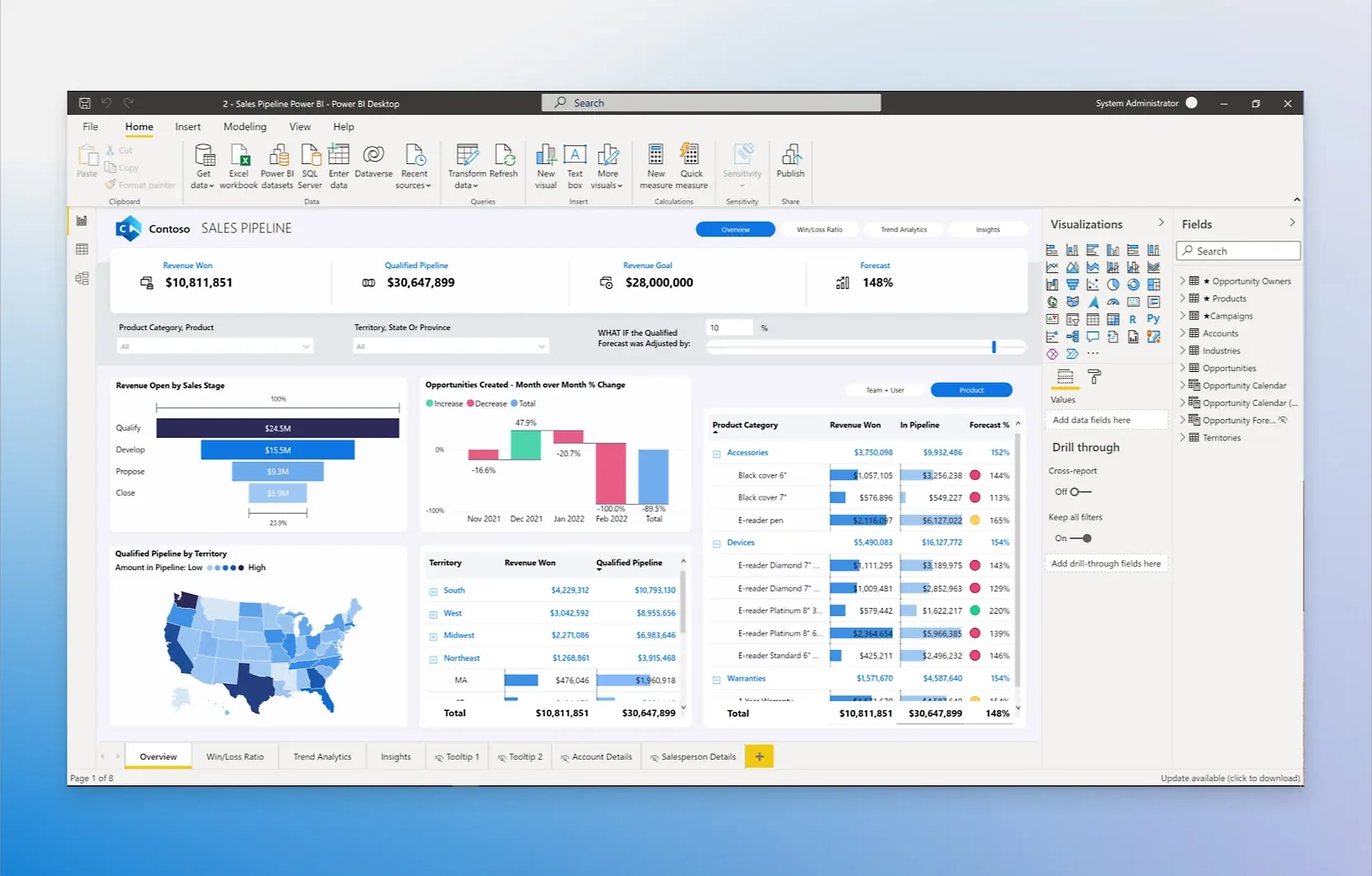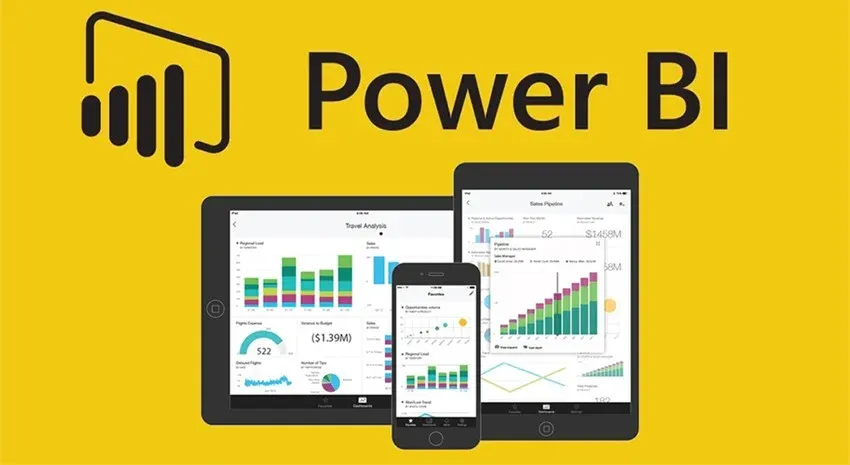Put down those calculators and spreadsheets. Data analysis shouldn't be a nightmare. You see, there's a thing called Microsoft Power BI, and it’s your knight in shining armor. It turns the often monstrous data analysis task into a simple and friendly experience, making it the perfect companion for businesses of all shapes and sizes.
Imagine someone who gathers information from every nook and cranny, pieces it together, and tells a meaningful story with it. That's Power BI. It connects the dots in a way that cuts through the fluff, while being informative and easy to digest.
Speaking of being informative, this guide's going to explore the wonders of Power BI. From its various benefits and uses to the many business sectors it can transform, we're about to unlock the potential of a tool that has slowly become an industry staple. Prepare for a deep dive into the world of Power BI and the countless possibilities it offers to businesses who want to make smarter decisions.
As we venture through the maze of data analysis, you'll find that Power BI is ultimately what every fairy tale lover would call a "happy ending" to the story. A powerful tool with an ability to empower businesses with knowledge—valuable and actionable insights—all derived from data that once seemed daunting.
Welcome to this enlightening journey where the hero—the humble yet mighty MS Power BI—leads the way to victory over the villain that is tangled, confusing data.
Embrace the Power BI experience, and get ready to change the way you see data analysis forever. Your journey to clearer, smarter, and faster data-driven decisions is about to begin. Hang on tight!
What is Data Analysis?
Data analysis is a process that's common and crucial in many fields. To put it in simple terms, it's like detective work. Just like a detective sifts through information and clues to solve a mystery, in data analysis, you sift through raw data to find patterns and answers. With data analysis, you get to ask questions about what happened, why it happened, and what could happen in the future.
Let's use a lemonade stand as an example. Let's say you sold lemonade over the summer. You collected data on how much money you made each day. Now, you want to look at this data to figure out what days were most profitable. This process of examining your sales data is a basic form of data analysis.

But in the digital world, these data can become massive, making the process a lot more complex. This is where tools like Powerbi come into play. Powerbi, also known as Microsoft BI or MS Power BI, is a business analytics tool that turns big piles of raw data into informative, easily understandable visuals.
Just like our lemonade stand, businesses use Power BI to make sense of their data. They do this to understand trends, make predictions about future performance, and make informed business decisions. The benefits of Power BI in data analysis can't be overstated. It can handle massive amounts of data from many different sources, all at once.
Power BI uses, therefore, range from simple tasks like tracking sales to more complex ones like predicting future trends or determining performance benchmarks. Whether it's a lemonade stand or a multinational company, data analysis is about making sense of information so you understand what's working well, what's not, and where there's room for improvement.
Suggested Reading:Benefits of Using Microsoft Power BI for Data Analysis
Key Benefits of Using Microsoft Power BI for Data Analysis
When we think of data analysis, we sometimes imagine complex processes and nerd-level statistics. That's why tools like Powerbi, or Microsoft BI/MS Power BI for those who prefer the official term, have become so essential.
They simplify the otherwise complicated journey of data analysis. As we explore further, you'll notice the benefits of Power BI are pretty impressive. Here are the key ways utilizing Power BI can enhance your data analysis tasks.

Easy Data Connectivity
The World Wide Web is abuzz with connection points from different devices pouring out data every second. Powerbi is adept at integrating all these data from various sources into one centralized system for further analysis. Whether you're pulling out spreadsheets, databases, or cloud services, MS Power BI makes data extraction a breeze. It’s like having a multi-tool that can open any kind of data 'nut'.
Using Power BI for your data analysis ensures a smooth flow of information from different points, speeding up your analysis and reducing your workload. The more connected your data is, the better you can understand and anticipate trends.
Boosts Centralized Data Management
Keeping your data scattered can feel like having pieces of a puzzle spread across multiple rooms. It's not fun, especially when quick decisions need to be made. One of the benefits of Power BI is its commitment to making data management centralized and easy.
Powerbi collects, organizes, and stores data in one accessible location. It's a library where all your valuable data 'books' are stored, ready for you to 'read'. MS Power BI tidies up any messy data architecture, allowing multiple users to analyze and update data simultaneously. Efficient, isn't it?
Suggested Reading:Benefits of Using Microsoft Power BI for Data Analysis
The Power of Sharing and Analyzing Big Data
Who knew that data could socialize? Powerbi not only gives you the means to interpret big data but also to share your insights with your team. One of the Microsoft BI tools' top benefits is its ability to democratize data access.
This MS Power BI feature means you can share dashboards and interactive reports with anyone - your team, clients, or stakeholders. Power BI uses make team collaboration and data-dependent decision making an inclusive and straightforward process.
Remember, shared knowledge is power. And Powerbi is all about empowering you with knowledge.
Ensuring Secure Data Analysis
Talking about data and ignoring security is like having a car and not talking about the brakes. Not going to work, right? Rest assured, Powerbi puts a big premium on security. Microsoft BI ensures that your data stays confidential, secure, and in the right hands.
MS Power BI comes with role-based access controls, meaning every user has specific and controlled access based on their role within the team. It's like assigning safe deposit boxes which can only be accessed with the right key. One pivotal part of Power BI uses is making sure that even while knowledge is shared, the data remains secure.
All in all, Powerbi is like having a trusty companion for your data analysis adventure. The benefits of Power BI are not just about making the journey simpler, but also more efficient and secure. With it, you're definitely on the right path to decode the secrets hidden in your data and use these insights to make better, informed decisions.
Practical Power BI Uses in Different Business Sectors
Here's the thing about Powerbi: it's not just a one-industry wonder. This tool, also known as Microsoft BI or MS Power BI when we're feeling official, fits snugly into every kind of business you can think of. It's all about piecing together data from different corners of a business and making sense of it.
The benefits of Power BI—a hitch-free ride through your data—are what make it universally handy. Power BI uses have carved out a niche in different business sectors because it's adaptable. Every sector has data, and every bit of that data tells a story. Powerbi helps unfold these stories in a way that's valuable for each unique business model.

Retail Sector: Understanding Customer Preferences
Imagine you're a retailer with stores everywhere, and you want to know what's selling where. Powerbi takes the mammoth task of gathering sales, inventory, and customer data and simplifies it. It helps retailers track what items are flying off the shelves in one store and gathering dust in another.
The MS Power BI dashboards provide insights—on customer behavior, peak sales periods, and inventory management—that can seriously boost retail strategy. Efficient and centralized, it's retail intelligence made simple.
Finance and Banking: Risk Management and Compliance
If you're in a bank, you're juggling numbers all day, every day. That's where Powerbi steps in, ensuring the data analysis doesn't turn into data paralysis. Microsoft BI helps banks monitor transactions in real time, detect fraud patterns, and manage financial risks by turning data into visuals that make sense.
Compliance? Yep, Power BI helps there too. Banks need to keep in line with regulations, and Powerbi can flag up things that look out of whack. It makes sure you stay on the right side of the rules.
Health Sector: Patient Care and Operational Efficiency
Hospitals have lots of data and not just medical records. They've got operational and administrative information, patient feedback, and more. Powerbi brings it all together, helping hospitals improve patient care, manage resources, and even nail down operational bottlenecks.
By analyzing patient data, hospitals can predict outbreaks, manage inventory, and ultimately, save lives. The story the data tells through MS Power BI can lead to improved healthcare delivery and patient outcomes.
Suggested Reading:Benefits of Using Microsoft Power BI for Data Analysis
Manufacturing: Streamlining Production
When you make stuff, you need to know how, when, and at what cost you're making it. Powerbi tracks everything from the supply chain to production floor efficiency and even product quality. Manufacturers can use data analysis to identify pain points in their production process, streamline operations, and reduce costs.
This is Power BI uses in action: turning what used to be guesswork into a finely-tuned process informed by actual data.
Education: Tracking and Improving Performance
Schools and universities can use Powerbi to keep an eye on student performance, faculty efficiency, and even operational costs. With Microsoft BI, educational institutions can analyze data across systems to help students succeed, improve teaching methods, and run the place more economically.
Data analysis with Power BI benefits education by creating a more tailored learning experience, highlighting areas that need improvement, and managing resources effectively.
Government: Smarter City Planning and Public Services
Government data is vast. But guess what? Powerbi can handle it. From traffic flow to resource allocation, Powerbi helps in planning smarter cities and better public services. It can take various datasets - traffic, public transportation usage, public housing needs - and turn them into actionable insights.
The MS Power BI tools ensure that data is leading the way for decisions that affect the public, making administration more responsive and responsible.
Powerbi, or MS Power BI, is a jack-of-all-trades in the data analysis game. The benefits of Power BI stretch across any business with data to crunch—which, in today's world, is every business. Each sector can harness the power of their data, turning numbers and metrics into meaningful changes and growth. So, no matter what business you're in, Powerbi has a role to play—a role that's about making your data work for you, not against you.
Conclusion
So, there you have it—a quick run-through of how Powerbi turns data analysis into a cakewalk. It doesn't matter what industry you're in. If there's data, Powerbi can make it sing. All those benefits of Power BI make it an indispensable tool, simplifying and streamlining the way we handle data.
What Powerbi does best is lift the veil on those hidden stories behind the numbers. It doesn't just give you an answer; it helps you understand the "why" behind the answer, too. And that's why MS Power BI is a must-have. It's about making data work for you.
Frequently Asked Questions (FAQs)
Can Power BI integrate with my existing IT infrastructure?
Yes, Microsoft BI is designed to seamlessly blend with existing technologies, databases, and systems.
Do you need special technical skills to use Power BI?
No. Powerbi's intuitive interface is user-friendly, even for non-technical users.
Is Power BI suitable for small businesses, or is it only for large enterprises?
Power BI can scale as per the needs of businesses, big or small.
Is it possible to share Power BI dashboards and reports with people who don't use the tool?
Yes, you can share reports externally, via publishing them to the web or sharing them in read-only format.


